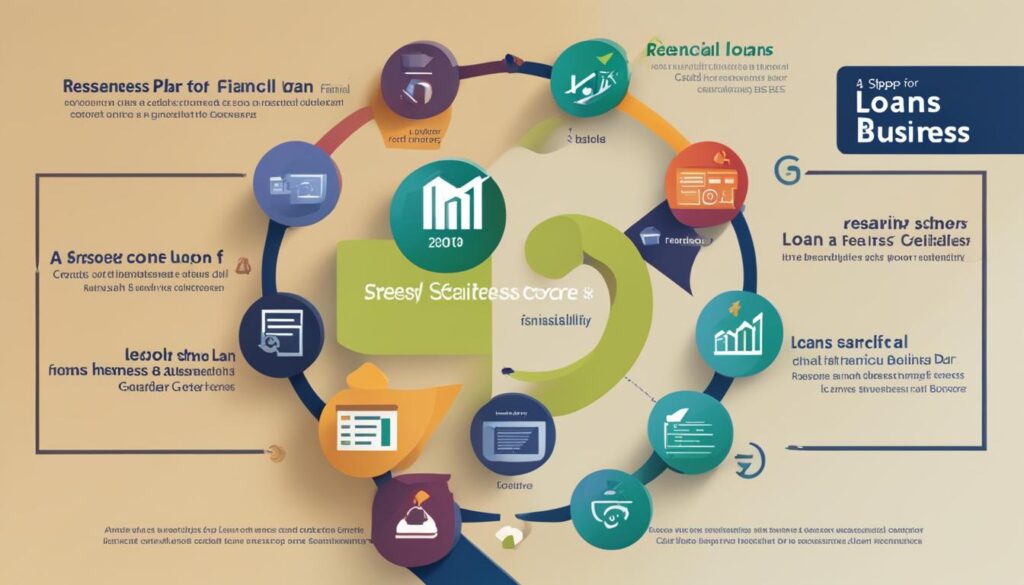Small businesses make up almost half of the private workforce in the United States, and securing a business loan can help start or grow a business. But how does a business loan work? Let’s explore the ins and outs of business loans and how they can benefit entrepreneurs and business owners.
Key Takeaways
- A business loan provides financing that needs to be repaid over time, typically with interest and fees.
- There are different types of business loans, including term loans and business lines of credit.
- Business loans can be secured or unsecured, and the funds can be used for various purposes such as working capital, equipment purchases, and business expansion.
- Qualifying for a business loan may require meeting certain requirements, such as credit score and time in business.
- Business owners have various options for getting a business loan, including traditional banks, online lenders, and credit unions.
What Is a Business Loan?
A business loan is a type of commercial financing that qualified businesses can obtain from traditional banks, online lenders, and credit unions. It is a form of funding that businesses can use to cover the costs of operating and growing, including working capital, equipment purchases, and real estate. Business loans can be obtained from various lenders, and the terms and conditions may vary.
How Do Business Loans Work?
Business loans work by providing business owners with the necessary funds to support their operations, whether through a lump-sum payment or a credit line. When a business applies for a loan, it agrees to repay the borrowed money over an agreed-upon period, typically with interest and fees. Business loans can be categorized into two main types: secured loans and unsecured loans.
Secured loans require the business to provide collateral, such as property or inventory, as a form of security in case the loan cannot be repaid. This reduces the risk for the lender and often results in more favorable loan terms. Unsecured loans, on the other hand, do not require collateral but may have higher interest rates to compensate for the increased risk to the lender.
The specific repayment terms for business loans can vary, depending on the lender and the loan agreement. It is common for lenders to require daily, weekly, or monthly payments to gradually repay the loan and interest. The repayment period can range from a few months to several years, depending on the loan amount and the borrower’s ability to repay.
Interest and fees
Business loans are not free, and borrowers are charged interest and fees for the use of the borrowed money. The interest rate for a business loan can be fixed or variable and is typically based on factors such as the borrower’s creditworthiness, the loan amount, and the repayment period. Fees may include origination fees, application fees, and late payment fees, among others.
Lump-sum payment vs. credit line
A lump-sum payment provides the borrower with the full loan amount upfront, which is especially useful for one-time expenses such as equipment purchases or business expansion. The borrower then repays the loan and interest according to the agreed-upon terms.
A credit line, on the other hand, functions more like a revolving credit account. The borrower can access funds up to a predetermined credit limit as needed, making it an ideal option for managing recurring expenses or fluctuating cash flow. Interest is typically charged only on the amount borrowed, not the entire credit line.
Understanding how business loans work is essential for any business owner seeking financing to support their growth and operations. Assessing the business’s needs, evaluating different loan options, and carefully reviewing the terms and repayment conditions will help business owners make informed borrowing decisions.
What Are Business Loans Used For?

Business loans are a valuable source of funding for small and large businesses alike. They can be used for various purposes to support business growth and operations. Here are some common uses for business loans:
- Startup Costs: Business loans can help cover the initial expenses of starting a new business, including purchasing inventory, leasing a workspace, and hiring employees.
- Commercial Real Estate Purchases: If your business needs to acquire a new property for expansion or relocation, a business loan can provide the necessary funds to finance the purchase.
- Cash Flow Management: Business loans can be used to manage cash flow fluctuations, ensuring that ongoing operational expenses, such as payroll and inventory restocking, can be met.
- Debt Consolidation: If your business has accumulated various high-interest debts, a business loan can be used to consolidate those debts into a single, more manageable payment.
- Equipment Purchases: Whether it’s upgrading outdated equipment or acquiring new machinery, business loans can provide the capital needed for equipment purchases, allowing businesses to improve productivity and efficiency.
It’s important to note that business loans are intended for business-related expenses and are not suitable for personal purchases, such as buying a home or personal vehicles.
Common Types of Business Loans

When it comes to financing their business needs, entrepreneurs have various options to choose from. Understanding the different types of business loans available can help business owners make informed decisions about which loan to pursue. Here are some common types of business loans:
- SBA loans: SBA loans, backed by the U.S. Small Business Administration, provide businesses with competitive interest rates and extended repayment terms. These loans are often sought after by small businesses due to their favorable terms and flexible use of funds.
- Term loans: Term loans are a popular option for businesses looking to finance specific projects or investments. These loans are taken out for a fixed term and require regular repayments of both principal and interest. Term loans are suitable for businesses that have specific financial objectives and need a lump-sum amount upfront.
- Working capital loans: Working capital loans are designed to help businesses manage their day-to-day operations and cover short-term expenses. They provide businesses with the necessary cash flow to fund their immediate needs, such as paying suppliers, covering payroll, or purchasing inventory.
- Business lines of credit: Business lines of credit offer businesses a predetermined credit limit that can be used as needed. Business owners can access funds from their line of credit whenever they require capital. This type of loan provides flexibility and is often used to address unexpected expenses or manage cash flow fluctuations.
- Merchant cash advances: Merchant cash advances provide businesses with an upfront lump sum in exchange for a percentage of future credit card or debit card sales. This type of loan is particularly common in industries where businesses generate a significant portion of their revenue through card transactions, such as retail or hospitality.
Each type of business loan has its own features and qualification requirements, so it’s important for business owners to explore their options and choose the loan that best fits their specific needs and financial goals.
Business Loan Requirements

To qualify for a business loan, businesses need to meet certain requirements set by lenders. These requirements typically include:
- Credit Score: Lenders often consider the credit score of the business owner when evaluating loan applications. A higher credit score generally indicates a lower risk for the lender.
- Annual Revenue: Lenders may require a certain level of annual revenue to ensure that the business has sufficient income to repay the loan.
- Time in Business: Some lenders may have minimum time in business requirements, such as at least one year of operation, to establish the business’s stability.
- Documentation: During the loan application process, lenders typically ask for various documentation to assess the business’s financial standing and viability. Common documents include business and personal tax returns, bank statements, profit and loss statements, and a well-developed business plan.
Meeting these requirements increases the likelihood of getting approved for a business loan, but lenders may also consider other factors, such as the industry in which the business operates and the purpose of the loan. It’s essential to thoroughly review and provide all required documentation to streamline the application process and increase the chances of securing the desired financing.
Obtaining a business loan requires satisfying specific criteria related to creditworthiness, financial stability, and the ability to provide necessary documentation.
It is crucial to note that specific loan requirements may vary depending on the lender, loan type, and individual circumstances. Taking the time to assess eligibility criteria and prepare the necessary documentation can help businesses navigate the loan application process successfully.
Business Loan Requirements Table
| Requirement | Description |
|---|---|
| Credit Score | The credit score of the business owner, which indicates their creditworthiness and ability to manage debt. |
| Annual Revenue | The minimum level of revenue generated by the business to demonstrate its financial stability. |
| Time in Business | The minimum duration of time the business has been operating to establish its stability and track record. |
| Documentation | Various documents required during the loan application process, such as tax returns, bank statements, profit and loss statements, and a well-developed business plan. |
Where to Get a Business Loan

When it comes to getting a business loan, business owners have several options to consider. Each option has its own advantages and disadvantages, so it’s important to evaluate the factors that matter most to your business. Here are some popular choices:
Direct Online Lenders
Direct online lenders provide a convenient and streamlined process for obtaining a business loan. These lenders operate entirely online, offering quick approvals and funding. They may have less stringent eligibility criteria compared to traditional lenders, making them accessible to businesses with less established credit histories or shorter operating times. Some popular direct online lenders include Kabbage, Funding Circle, and OnDeck.
Large Commercial Banks
Large commercial banks are well-established financial institutions that offer a wide range of banking services, including business loans. These banks often provide competitive interest rates and ample funding amounts for businesses with strong financials and established credit histories. Examples of large commercial banks include Wells Fargo, Bank of America, and JPMorgan Chase.
Large Community Banks
Large community banks, also known as regional or local banks, provide business loans to the communities they serve. These banks offer personalized service and a deep understanding of the local business landscape. They may be more flexible in their loan approval process and supportive of small businesses. Some well-known large community banks include KeyBank, U.S. Bank, and BB&T.
Peer-to-Peer Lending Sites
Peer-to-peer lending sites connect individual investors with borrowers, including businesses. These platforms offer an alternative to traditional banks and can provide access to capital when traditional lenders are not an option. Peer-to-peer lending sites typically have a transparent and user-friendly application process. Popular peer-to-peer lending platforms include LendingClub and Prosper.
SBA-Backed Bank Lenders
The Small Business Administration (SBA) partners with select banks to provide government-backed loans to small businesses. These loans offer favorable terms and lower interest rates. SBA-backed bank lenders follow the SBA’s guidelines, which include specific eligibility requirements and paperwork. While the application process may be more involved, the benefits can be worth it. Examples of SBA-backed bank lenders include Wells Fargo, Chase, and TD Bank.
“Choosing the right lender for your business loan can have a significant impact on your financing experience and overall success. Consider factors such as interest rates, loan terms, eligibility criteria, and the level of personalized service you desire.”
Ultimately, the best place to get a business loan depends on your business’s unique needs and circumstances. Carefully consider the offerings and requirements of each option before making your decision. Keep in mind that you can also consult with financial advisors or work with loan brokers who can help you navigate the loan application process and find the best lender for your specific situation.
How to Qualify for a Business Loan

Qualifying for a business loan involves several key factors that lenders consider when assessing the eligibility of a business. By understanding and addressing these factors, businesses can increase their chances of qualifying for the funding they need.
- Credit Score: A good credit score is crucial for qualifying for a business loan. Lenders typically look for a credit score above 700, demonstrating a history of responsible credit management.
- Cash Flow: Stable cash flow is another important consideration. Lenders want to ensure that businesses have regular income to cover loan repayments. Clear financial statements and cash flow projections can help demonstrate the ability to meet loan obligations.
- Time in Business: Lenders often prefer businesses with an established track record. Most lenders require businesses to be operational for a certain period, such as at least two years, to demonstrate stability and reliability.
- Business Plan: A well-developed business plan is essential for demonstrating the viability and potential growth of the business. Lenders want to see a clear plan for utilizing the loan funds efficiently and achieving business objectives.
Addressing these factors increases the chances of qualifying for a business loan. Financial discipline, accurate financial records, and a solid business plan are instrumental in showcasing the potential for successful loan repayment. Business owners should also research and understand lender-specific requirements to tailor their loan applications appropriately.
| Factors | Importance |
|---|---|
| Credit Score | High |
| Cash Flow | High |
| Time in Business | Medium |
| Business Plan | Medium |
“Having a good credit score, stable cash flow, and a well-developed business plan are key factors in qualifying for a business loan.”
Types of Small Business Loans

When businesses are in need of financial assistance, there are various types of small business loans they can consider. Understanding the different options and their specific purposes can help businesses make an informed decision. Here are some common types of small business loans:
1. Small Business Line of Credit: A small business line of credit provides businesses with a predetermined credit limit that they can access whenever they need funds. It offers flexibility, allowing businesses to borrow only what they need and pay interest only on the amount borrowed. This type of loan is suitable for managing cash flow fluctuations or covering short-term expenses.
2. Accounts Receivable Financing: Also known as invoice financing or factoring, accounts receivable financing involves borrowing against outstanding invoices. Businesses can receive a cash advance based on the value of their unpaid invoices and repay the loan once their customers settle the outstanding amounts. This type of loan is beneficial for businesses with a high volume of outstanding invoices but limited cash flow.
3. Working Capital Loans: Working capital loans are designed to finance day-to-day operations, including inventory purchases, payroll, and operating expenses. These loans provide businesses with the necessary capital to cover short-term financial needs. Repayment terms and interest rates may vary based on the lender and the business’s financial health.
4. Small Business Term Loans: Small business term loans offer a lump-sum amount that businesses can use for various purposes, such as business expansion, equipment purchases, or refinancing existing debt. The borrowed amount is repaid over a fixed term with regular installments, including interest and fees. Term loans can be secured or unsecured, depending on the lender’s requirements.
Each type of small business loan has its own advantages and considerations. Businesses should evaluate their financial goals, cash flow needs, and repayment capabilities before choosing the most suitable option. Consulting with lenders and financial advisors can help businesses navigate through the loan application process and make informed decisions.
Also Read : Smart Money Moves: Discover The Power Of A Chase Personal Loan Today!
Conclusion
Business loans play a crucial role in providing businesses with the necessary financing to start or expand their operations. By securing business financing from various lenders, businesses can access capital to meet their diverse needs, such as working capital, equipment purchases, and business expansion. Understanding the workings of business loans and meeting the necessary requirements is key to securing the funding needed for growth and success.
One of the main benefits of business loans is the flexibility they offer. Whether it’s a term loan or a business line of credit, businesses have the freedom to choose the type of financing that suits their specific requirements. This allows them to effectively manage their cash flow and make strategic investments to propel their growth.
To secure a business loan, businesses must meet certain requirements, which may include a good credit score, sufficient cash flow, and a well-developed business plan. By meeting these criteria, businesses can demonstrate their financial stability and repayment capacity to lenders, increasing their chances of approval for business financing.
In summary, business loans provide a lifeline for businesses, offering them the opportunity to access capital to fuel their growth and success. By understanding the intricacies of business loans and meeting the necessary requirements, businesses can secure the financing they need to thrive in today’s competitive marketplace.
FAQs
Q: What is a business loan?
A: A business loan is a type of financing designed to help business owners manage their cash flow, purchase equipment, expand their business, or cover other major expenses.
Q: How does a business loan work?
A: Business loans work by providing a lump sum of money that the borrower must repay with interest over a predetermined period of time. The terms of the loan, including the interest rate and repayment schedule, are agreed upon by the lender and borrower.
Q: What are the common types of business loans?
A: Common types of business loans include term loans, SBA loans, business lines of credit, equipment loans, and commercial real estate loans.
Q: What are the requirements to apply for a business loan?
A: Requirements to apply for a business loan typically include a good business credit score, a detailed business plan, financial statements, and in some cases, collateral.
Q: How can I improve my chances of getting approved for a business loan?
A: You can improve your chances of getting approved for a business loan by having a strong business credit score, a solid business plan, and sufficient collateral or assets to back the loan.
Q: What is the business loan application process like?
A: The business loan application process involves filling out an application, providing necessary documentation, such as financial statements and business plans, and undergoing a credit check and evaluation by the lender.
Q: How does business loan repayment work?
A: Business loan repayment involves making regular payments, usually monthly, that include both the principal amount borrowed and the interest accrued on the loan.
Q: What are the best business loan options for small business owners?
A: The best business loan options for small business owners may include SBA loans, business lines of credit, or short-term loans, depending on their specific needs and financial situation.
Q: How does personal and business credit affect the business loan application?
A: Lenders consider both personal and business credit when evaluating a business loan application. A strong credit history demonstrates financial responsibility and can improve the chances of loan approval.
Q: What are the key factors to consider when choosing the right loan for your business?
A: Key factors to consider when choosing the right loan for your business include the loan amount needed, the purpose of the loan, the repayment terms, and the interest rate, as well as any specific requirements for the loan.
Source Links
- https://www.investopedia.com/how-do-business-loans-work-7550170
- https://www.experian.com/blogs/ask-experian/how-do-small-business-loans-work/
- https://www.forbes.com/advisor/business-loans/how-do-business-loans-work/